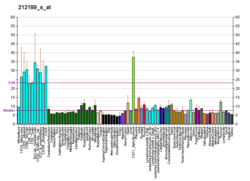From Wikipedia, the free encyclopedia
Protein-coding gene in the species Homo sapiens
Conserved oligomeric Golgi complex subunit 4 is a protein that in humans is encoded by the COG4 gene .[ 5] [ 6]
Multiprotein complexes are key determinants of Golgi apparatus structure and its capacity for intracellular transport and glycoprotein modification. Several complexes have been identified, including the Golgi transport complex (GTC), the LDLC complex, which is involved in glycosylation reactions, and the SEC34 complex, which is involved in vesicular transport. These 3 complexes are identical and have been termed the conserved oligomeric Golgi (COG) complex, which includes COG4 (Ungar et al., 2002).[supplied by OMIM][ 6]
COG4 has been shown to interact with COG7 ,[ 7] COG2 ,[ 7] COG1 [ 7] COG5 .[ 7]
Mutations in this gene have been associated with Saul-Wilson syndrome .[ 8]
^ a b c GRCh38: Ensembl release 89: ENSG00000103051 – Ensembl , May 2017^ a b c GRCm38: Ensembl release 89: ENSMUSG00000031753 – Ensembl , May 2017^ "Human PubMed Reference:" . National Center for Biotechnology Information, U.S. National Library of Medicine .^ "Mouse PubMed Reference:" . National Center for Biotechnology Information, U.S. National Library of Medicine .^ Ungar D, Oka T, Brittle EE, Vasile E, Lupashin VV, Chatterton JE, Heuser JE, Krieger M, Waters MG (Apr 2002). "Characterization of a mammalian Golgi-localized protein complex, COG, that is required for normal Golgi morphology and function" . J Cell Biol . 157 (3): 405–15. doi :10.1083/jcb.200202016 . PMC 2173297 PMID 11980916 . ^ a b "Entrez Gene: COG4 component of oligomeric golgi complex 4" .^ a b c d Loh, Eva; Hong Wanjin (Jun 2004). "The binary interacting network of the conserved oligomeric Golgi tethering complex" . J. Biol. Chem . 279 (23). United States: 24640–8. doi :10.1074/jbc.M400662200 ISSN 0021-9258 . PMID 15047703 . ^ Ferreira C (2020) Saul-Wilson syndrome. In: Adam MP, Ardinger HH, Pagon RA, Wallace SE, Bean LJH, Stephens K, Amemiya A, editors. SourceGeneReviews. Seattle (WA): University of Washington, Seattle
Whyte JR, Munro S (2001). "The Sec34/35 Golgi transport complex is related to the exocyst, defining a family of complexes involved in multiple steps of membrane traffic" . Dev. Cell . 1 (4): 527–37. doi :10.1016/S1534-5807(01)00063-6 PMID 11703943 . Loh E, Hong W (2002). "Sec34 is implicated in traffic from the endoplasmic reticulum to the Golgi and exists in a complex with GTC-90 and ldlBp" . J. Biol. Chem . 277 (24): 21955–61. doi :10.1074/jbc.M202326200 PMID 11929878 . Strausberg RL, Feingold EA, Grouse LH, et al. (2003). "Generation and initial analysis of more than 15,000 full-length human and mouse cDNA sequences" . Proc. Natl. Acad. Sci. U.S.A . 99 (26): 16899–903. Bibcode :2002PNAS...9916899M . doi :10.1073/pnas.242603899 PMC 139241 PMID 12477932 . Ota T, Suzuki Y, Nishikawa T, et al. (2004). "Complete sequencing and characterization of 21,243 full-length human cDNAs" . Nat. Genet . 36 (1): 40–5. doi :10.1038/ng1285 PMID 14702039 . Hillman RT, Green RE, Brenner SE (2005). "An unappreciated role for RNA surveillance" . Genome Biol . 5 (2): R8. doi :10.1186/gb-2004-5-2-r8 PMC 395752 PMID 14759258 . Loh E, Hong W (2004). "The binary interacting network of the conserved oligomeric Golgi tethering complex" . J. Biol. Chem . 279 (23): 24640–8. doi :10.1074/jbc.M400662200 PMID 15047703 . Suzuki Y, Yamashita R, Shirota M, et al. (2004). "Sequence comparison of human and mouse genes reveals a homologous block structure in the promoter regions" . Genome Res . 14 (9): 1711–8. doi :10.1101/gr.2435604 . PMC 515316 PMID 15342556 . Gerhard DS, Wagner L, Feingold EA, et al. (2004). "The status, quality, and expansion of the NIH full-length cDNA project: the Mammalian Gene Collection (MGC)" . Genome Res . 14 (10B): 2121–7. doi :10.1101/gr.2596504 . PMC 528928 PMID 15489334 . Rual JF, Venkatesan K, Hao T, et al. (2005). "Towards a proteome-scale map of the human protein-protein interaction network". Nature . 437 (7062): 1173–8. Bibcode :2005Natur.437.1173R . doi :10.1038/nature04209 . PMID 16189514 . S2CID 4427026 . Kimura K, Wakamatsu A, Suzuki Y, et al. (2006). "Diversification of transcriptional modulation: large-scale identification and characterization of putative alternative promoters of human genes" . Genome Res . 16 (1): 55–65. doi :10.1101/gr.4039406 . PMC 1356129 PMID 16344560 .





